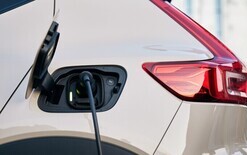UK car sales climb

The new-car market in the UK recorded its second successive year of growth with 1,952,778 units hitting the road in 2024 for a rise of 2.6 per cent on the previous year, according to the Society of Motor Manufacturers and Traders (SMMT).
In the final month of the year, the market remained flat at 140,786 units for a marginal 0.2 per cent decline to cap off a challenging year for the sector as manufacturers strove to create demand for EVs in a bid to meet new mandated sales targets.
Over the full year, growth was delivered entirely by fleets, up 11.8 per cent to reach 1,163,855 units, accounting for a record 59.6 per cent share of new car registrations.
Conversely, registrations by private buyers fell by 8.7 per cent to 746,276 units – less than in 2020 when the Covid-19 pandemic shut the market for three months. The far smaller business sector saw uptake fall by 3.1 per cent to 42,647.
The first year of mandated targets for new zero-emissions vehicles (ZEVs) finished with a strong December performance with 43,656 BEV sales accounting for 31 per cent of the market.
As a result, fully electric models made up 19.6 per cent of the market with 381,970 units in 2024, up by more than one-fifth and 67,283 units from 2023 but short of the 22 per cent demanded by the mandate.
The SMMT says the industry has pulled every lever to try to achieve this target, with manufacturers discounting totalling more than £4.5 billion – or about NZ$10b – in 2024, an amount that’s unsustainable in the long term.
Billions of pounds of investment in new technologies and products over the past decade has delivered a record 132 ZEV models to the UK market, up 38 per cent since 2023 to account for one-third of all models available, with an average range of almost 450km – more than two weeks’ driving for most people.
One of the major constraints to growth, however, has been lacklustre demand by private buyers with only one-in-10 choosing an EV in 2024.
Petrol remained the most popular powertrain among these buyers, commanding 61 per cent of demand, with hybrids in second place on 16 per cent.
On the flipside, about 64,000 more BEVs were registered by businesses and fleets than a year ago with such vehicles representing 25.4 per cent of those segments’ registrations. That demonstrated the effectiveness tax incentives afforded to non-private buyers.
Mike Hawes, the SMMT’s chief executive, pictured, says: “A record year for EV registrations underscores manufacturers’ unswerving commitment to a decarbonised new-car market with more choice, better range and increased affordability than ever.
“This has come at huge cost, however, with the billions invested in new models being supplemented by generous incentives which are unsustainable.
“We need rapid results from a regulatory review and urgent substantive support for consumers – else automotive investments will be at risk, and the jobs, economic growth and net-zero ambitions we all share will be in jeopardy.”
Across the total market, pure petrol and diesel registrations fell by 4.4 and 13.6 per cent respectively as more buyers swapped either to BEVs, or to lower-emissions hybrids, up 9.6 per cent, and plug-in hybrids, up 18.3 per cent.
Consequently, average new car carbon dioxide (CO2) emissions fell by 6.2 per cent to 102.1g/km.
While this will assist some manufacturers with mandate compliance, the extent to which it will help will remain unclear until confirmed baseline CO2 figures are provided by government.
Meeting the mandate thresholds in 2025 will be even more intense as the target is now 28 per cent – requiring an EV market uplift of just under 50 per cent.
Action is needed now to amend the regulation to reflect the reality of a constrained market and ZEV demand failing to grow in line with expectations.
When the previous government drew up plans for a mandate, the 2024 BEV market was forecast to be almost 20 per cent – or some 75,000 units – larger than has eventuated.
With manufacturer support at record but unstainable levels, says the SMMT, the UK government must do more to stimulate private demand and challenge charge-point operators to accelerate rollout.





